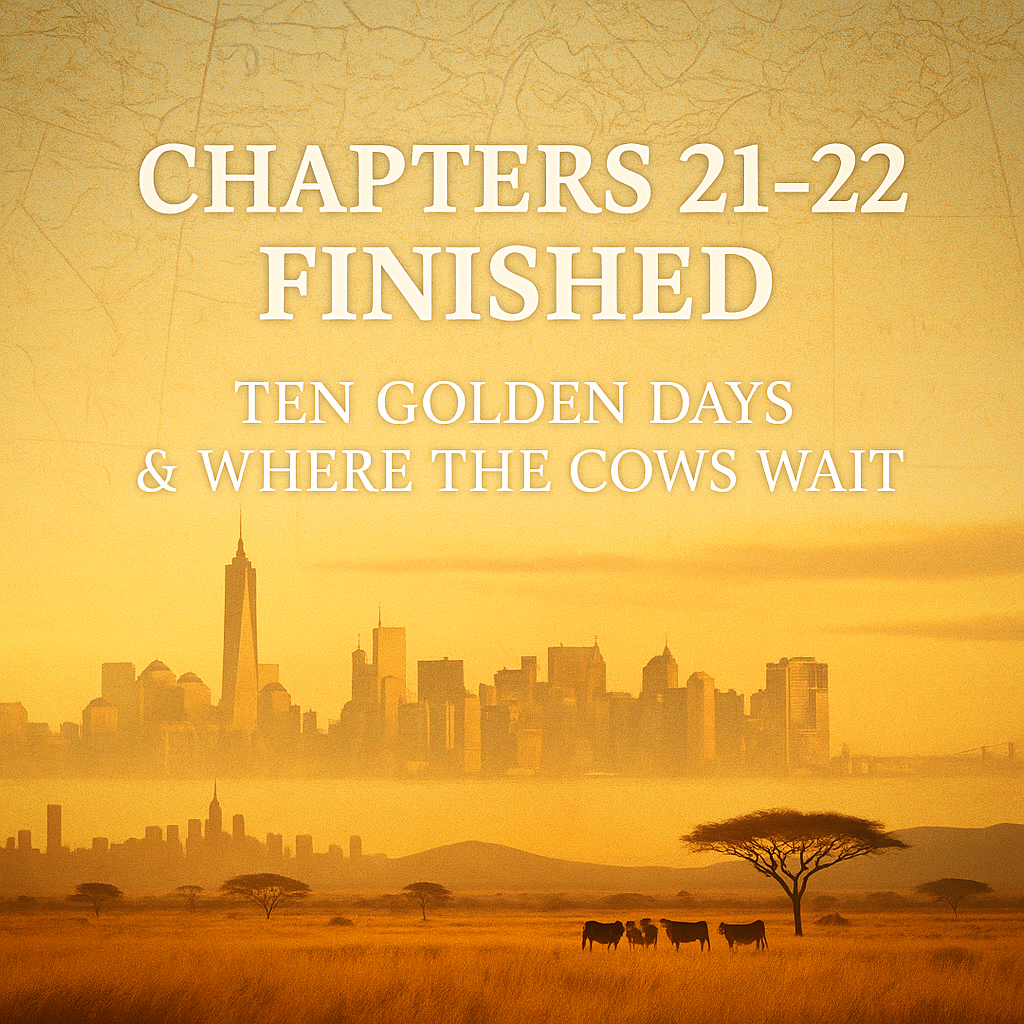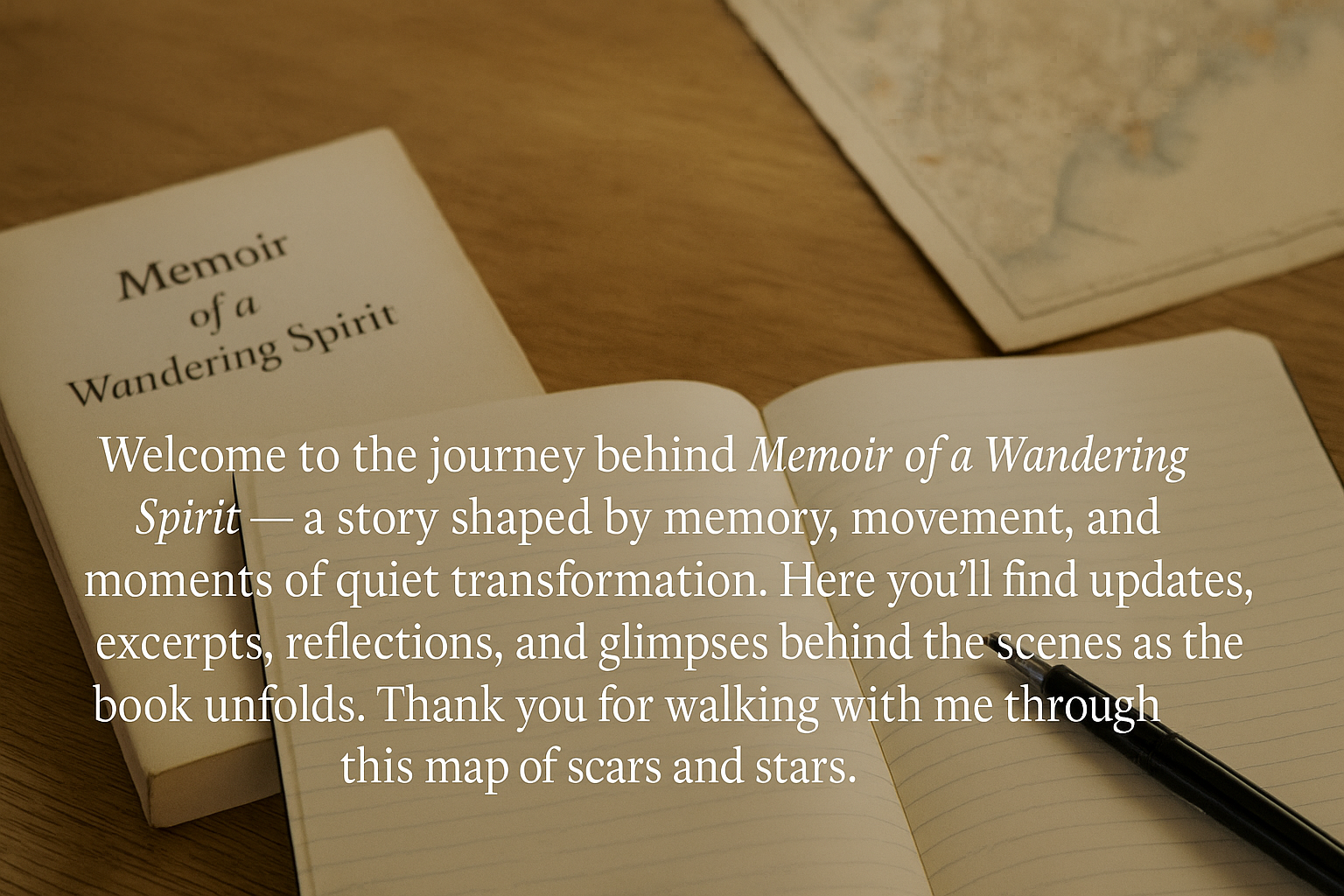✨ Two New Chapters: “Ten Golden Days” & “Where the Cows Wait”

✨ Two New Chapters: “Ten Golden Days” & “Where the Cows Wait”
The journey continues. Two new chapters are complete — and with them, Kacper crosses another threshold in his long passage through war, work, and wonder.
Chapter 21 – Ten Golden Days
This chapter moves between two kinds of quiet: the strange hush of New York debrief days after Angola, and the tender stillness of a pilgrimage to Przemyśl with Mama. It sits in the tension between glass towers and cemetery pines, between lavender sheets in Lower Manhattan and the remembered mud of Bentiu — a week that lets Kacper feel both the distance from the field and the thread that still binds him to it.
In New York, he arrives bone-tired, slips into a small guest house in Lower Manhattan run by Peter and John, and discovers how comfort can sharpen memory: the softness of linens pulling Bentiu back into the room — swamp reeds, gunfire, sacks of sorghum intruding on blue walls and polished floors. The city glitters; his body refuses to forget. On Sunday, a grace note — a reunion with Magda and Ania from Nowy Sącz. They wander Times Square, drift into the hush of Central Park, tuck into a riverside walk along the Hudson; friendship steadies the day.
Then home to Nowy Sącz — and a drive east with his mother to Przemyśl, to look for Aunt Rozalia’s grave. The town greets them with San River light and old Galician façades. At the cemetery, time folds: pines, oaks, linden, birch; damp leaves underfoot; angels with broken wings; Cyrillic and Latin scripts side by side. Hours pass before they find the simple mound marked Grób Sióstr Świętej Felicyty — Sr. Rozalia. They stand a long while without speaking; grief and gratitude share the air.
A few brief excerpts
“The contrast itself seemed to be the essence of his life — Manhattan and Bentiu, lavender and swamp reeds, soft linen and dust.”
“Sunday unfolded with a brightness he had not expected… They showed him their hidden corners too — a bookshop folded between glass towers, a café with worn wooden tables, the riverside walk along the Hudson where the roar of traffic softened into the rhythm of water.”
“The cemetery gates stood tall and unhurried… It was still green — impossibly green… Catholic and Orthodox markers stood side by side — Latin and Cyrillic script entwined like old neighbours in quiet conversation.”
“Set apart from the more elaborate monuments… a simple iron cross… a small wooden plaque, lovingly carved: Grób Sióstr Świętej Felicyty — Sr. Rozalia.”
📷 Related photo albums for Chapter 21:
• Album 1 – Meeting in Sitges, Spain
• Album 2 – Visiting Przemysl, Poland
Chapter 22 – Where the Cows Wait
The flight south brings him to Nairobi, 2005. A new posting, a new continent’s rhythm. The war in Sudan has paused — but peace itself feels fragile, tentative, “a promise whispered more than shouted.” The city hums, half-hopeful, half-tired.
He meets Martin, the cautious programme manager whose kindness hides behind slow words, and Ruth, the logistician whose laughter never burns out. They will become his compass in the months to come. But first comes Lokichoggio, and then the north — the borderlands where planes land on airstrips of baked clay and the line between safety and need is drawn in dust.
“Southern Sudan was no longer at war, but neither was it yet healed. The land itself had not caught its breath.”
What follows is one of the book’s most haunting journeys — to Old Fangak, a village half-drowned by swamps and memory. Here, Kacper learns what endurance looks like without spectacle. Hunger and faith coexist, silence speaks louder than policy, and even peace smells faintly of smoke.
“He began to see what hunger meant — not statistically, but bodily, intimately. Poverty was grief, was infection, was silence after the last breath.”
And then, the discovery that gives the chapter its name: the cows. Sacred, sung, guarded by boys barely older than children. They are wealth, diary, ancestor, and song — the living heart of the Nuer world.
“Cows were not animals here. They were spirit and wealth and prayer. They were diaries and dowries, ancestors and heirs.”
Through them, Kacper grasps a truth larger than aid or ambition — that dignity and survival are not gifts to be given but languages to be learned. The final pages breathe with stillness and reverence:
“Sometimes he thought of the imbalance — of children lying hungry while cattle were led to higher ground. It felt cruel. But then, when he looked closer, it was almost holy — a covenant written in mud and milk.”
When he finally leaves, Ama folds laundry in silence — a quiet goodbye heavier than words.
“Fangak had entered like water through cracked earth — slow, steady, impossible to remove.”
Back in Nairobi, he realises he is no longer the man who arrived. Something in him has softened, widened, learned to wait.
Between Glory and Quiet
These two chapters mark a turning point. Kacper steps out of survival and into responsibility — no longer just the witness, but the one who must decide, lead, and sometimes fail. The tone of the memoir matures with him: the writing grows slower, more spacious, haunted by the awareness that every victory is partial, every lesson incomplete.
From the frozen light of Manhattan to the humid dawns of the Upper Nile, Memoir of a Wandering Spirit continues to map not only the world’s crises but also the small, stubborn sanctuaries that endure within them — friendship, faith, humility, and the grace of work done with open eyes.
“He knew this was just the beginning.”

